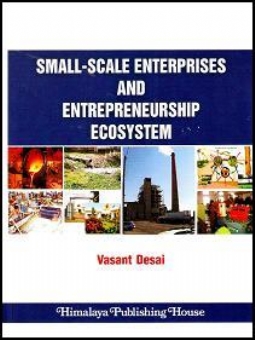Small-scale Enterprises and Entrepreneurship Ecosystem are the two faces of the same coin − economic develpment. Both are partenering in Socio-economic and Cultural Progress of Small-scale industries are the engines of growth in any economy.
In terms of value, the small sector accounts for 95 per cent of the industrial units, 45 per cent of the manufacturing output, 40 per cent of the total exports and providing employment to about 68.80 million persons in over 30 million units spread over the length and breadth of the country.
They are the job-providers and technological innovators. Above all, they are the beehive of entrepreneurship. Entrepreneurs identify and develop business enterprise, building opportunities for small enterprises and entrepreneurship are thus, the driving force for sustained national economic growth.
“SMALL-SCALE INDUSTRIES AND ENTREPRENEURSHIP ECOSYSTEM” is designed to encourage people to seize control over their destiny and make a profitable career through self-employment. The study consists of 38 chapters.
– Divided into two self-contained units comprising of objectives, inputs and analysis.
– Discusses the tools and techniques of small-scale industries and varied facets of entrepreneurship.
– A lucid analysis of varied facets of small industry and entrepreneurship acts as a motivator to all concerned-entrepreneurs, start-ups, students, teachers and planners.
– Provides a comprehensive study of small-scale industries and entrepreneurship.
– Enrished with practical tips and considerations on how to recognise and seize the business opportunities and plan one`s own successful ventures in a global competitive environment.
– Especially useful to students, teachers, resource persons engaged in conducting entrepreneurship training programmes in India, Asia and abroad.
Contents :
1. Introduction
Section – I : Small-Scale Enterprises
2. The Concept of Small-Scale Industry
3. Evolution of the Concept of Small-Scale Industries
4. Characteristics of Small-Scale Industries
5. The Role of Small-Scale Industries
6. Policies Governing SMEs
7. Rural Industries and Rural Artisans
8. Ancillary Industries
9. Industrial Estates
10. Organisational Structure of Small-Scale Industries
11. Ownership Pattern in Small-Scale Industry
12. Finance for Small-Scale Industries
13. Working Capital Management
14. Taxation Benefits
15. Marketing Mechanism in Small-Scale Industries
16. Export Potentials of Small-Scale Industries
17. E-Commerce
18. Problems of SMEs
19. Prospects for Small-Scale Industries in the Twenty-first Century
Section – II : Entrepreneurship Eco-system
20. The Concept of Entrepreneurship
21. The Entrepreneur
22. Evolution of Entrepreneurship in India
23. Characteristics of Entrepreneurs
24. Classification and Types of Entrepreneurs
25. Women Entrepreneurs
26. The Intrapreneur
27. Growth of Entrepreneurs
28. Growth of Entrepreneurial Activity
29. The Role of Entrepreneurs
30. Entrepreneurial Environment
31. Identification of Opportunities
32. Converting Business Opportunities into Reality
33. Location Issues
34. Environmental Problems
35. Entrepreneurial Development
36. Entrepreneurial Training
37. Institutions in Aid of Entrepreneurship Development
38. Legal Framework for Small Business
The Case Study







